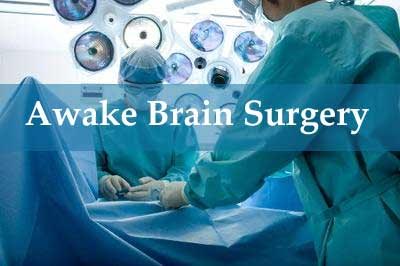- Home
- Editorial
- News
- Practice Guidelines
- Anesthesiology Guidelines
- Cancer Guidelines
- Cardiac Sciences Guidelines
- Critical Care Guidelines
- Dentistry Guidelines
- Dermatology Guidelines
- Diabetes and Endo Guidelines
- Diagnostics Guidelines
- ENT Guidelines
- Featured Practice Guidelines
- Gastroenterology Guidelines
- Geriatrics Guidelines
- Medicine Guidelines
- Nephrology Guidelines
- Neurosciences Guidelines
- Obs and Gynae Guidelines
- Ophthalmology Guidelines
- Orthopaedics Guidelines
- Paediatrics Guidelines
- Psychiatry Guidelines
- Pulmonology Guidelines
- Radiology Guidelines
- Surgery Guidelines
- Urology Guidelines
Milestone: Govt Hospital Doctors perform Awake Craniotomy

Nagpur: Achieving a new milestone, the doctors at Super Specialty Hospital (SSH) attached to the Government Medical College and Hospital (GMCH) here, successfully removed the brain tumor while the patient remained awake and observed his surgery.
In medical terms, it is called as an awake craniotomy and is first of its kind in the known medical history the district.
“This is the first such awake procedure done in SSH. The patient was suffering from seizures, vomiting, and headache. The scan showed a tumour in the portion of the brain which controls the speech, limb movements and vision. To ensure that these functions are not affected during the surgery the patient is given only local anaesthesia while cutting the brain skull,” said Dr Lulu Fatema Vali, in charge of neuro-anaesthesia at SSH.
The entire procedure was performed in one and half hours,while the patient was awake and talking to the anaesthetists and neurosurgeon.
He was earlier counseled to react to the instructions like seeing, talking, moving limbs etc during the surgery.
Dr Pramod Giri, Professor and head of neurosurgery department told mediapersons here that the tumour was pressing over many important areas of the brain, thalamus and the brainstem and Wermickes.
Hence, instead of performing the surgery in general anaesthesia where the surgeon would not know the effect of the surgery while operating we decided to conduct awake craniotomy, so that we could save all the basic functions of the body.
"It was the only solution for best results," he said.
Dr Vali said that the awake craniotomy decreases the cost of drugs heavily as no general anaesthesia drugs, which are very expensive, are used.It also puts the patient back on the feet immediately after the operation.
Dr Vali said that the patient was also put on certain anti-anxiety drugs to calm him during the procedure. “Sometimes the patient may land up into convulsions and swelling of brain could occur. In such situation we have to be prepared to put him on the general anaesthesia. The awake craniotomy decreases the cost of drugs heavily as no general anaesthesia drugs which are very expensive are used. It also puts the patient back on the feet immediately after the operation. This patient was very cooperative hence there were no hi-cups during the surgery,” she told, Nagur Times
Dr Lokendra Singh, senior neurosurgeon and director, Dr M Taori Central India Institute of Medical Sciences (CIIMS) who has done quite a few awake craniotomy said, it is heartening to see that awake craniotomy was being done in government set up.
The team of anaesthetists led by Dr Vali included Dr Rajesh Nagmote, Dr Abhay Ganar, Dr Ketki Ramteke, Dr Neha Gedam and Dr Neha Shahane.

Disclaimer: This site is primarily intended for healthcare professionals. Any content/information on this website does not replace the advice of medical and/or health professionals and should not be construed as medical/diagnostic advice/endorsement or prescription. Use of this site is subject to our terms of use, privacy policy, advertisement policy. © 2020 Minerva Medical Treatment Pvt Ltd